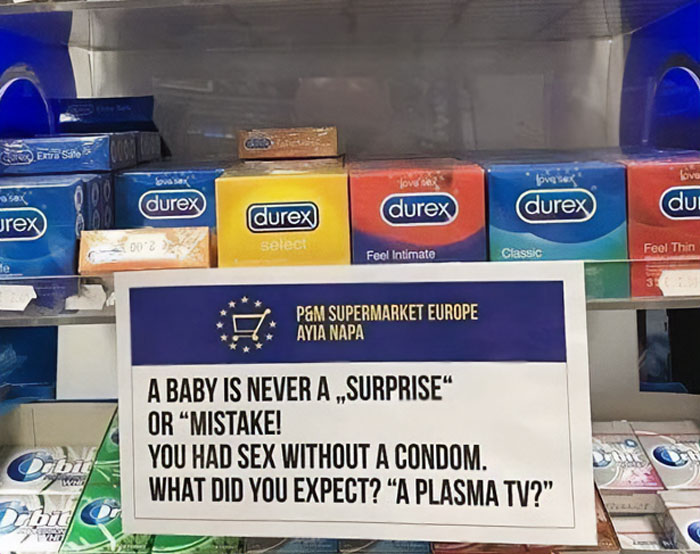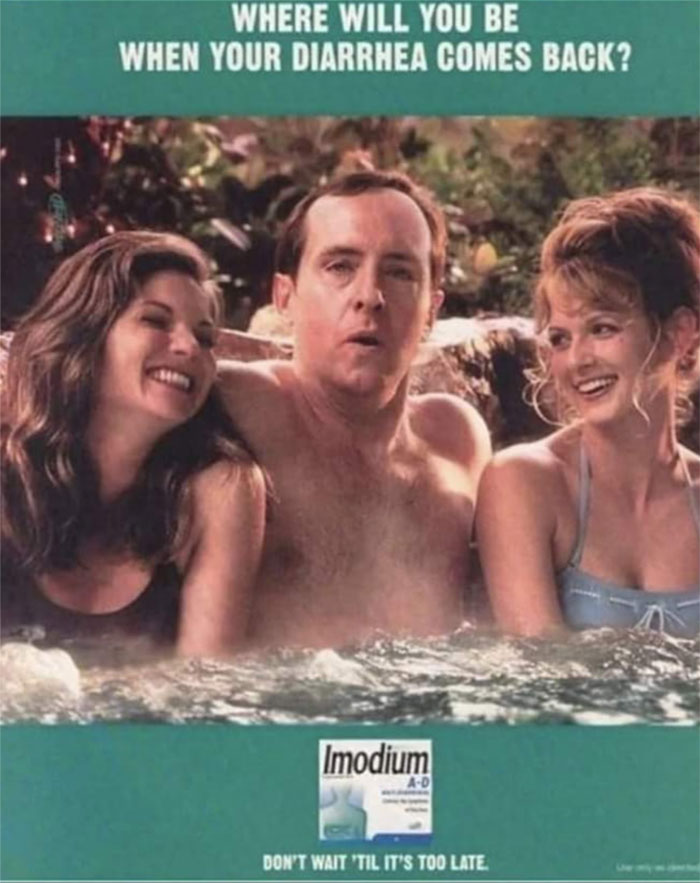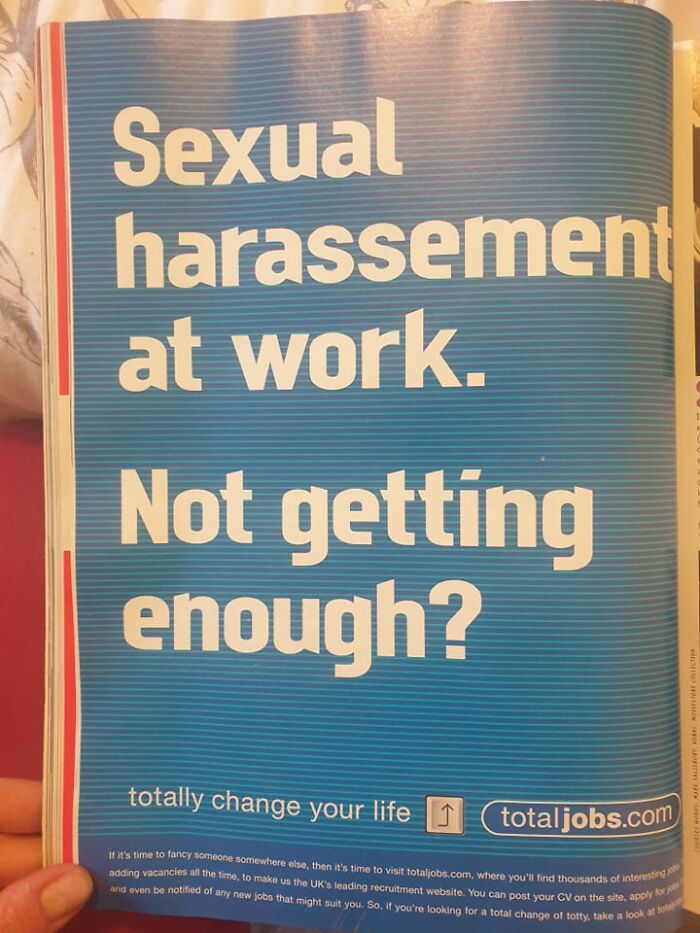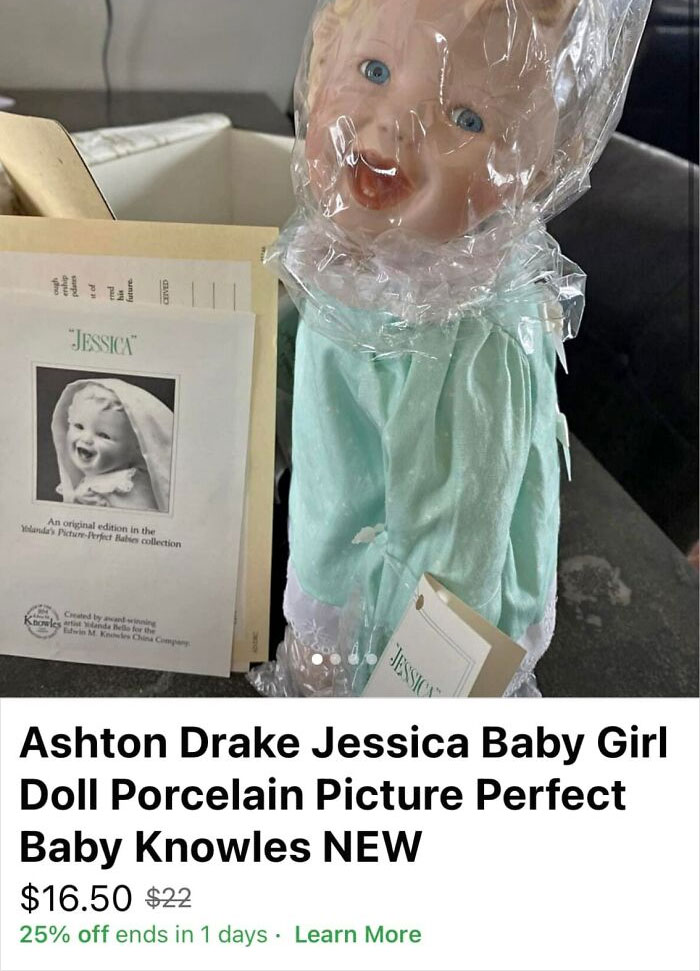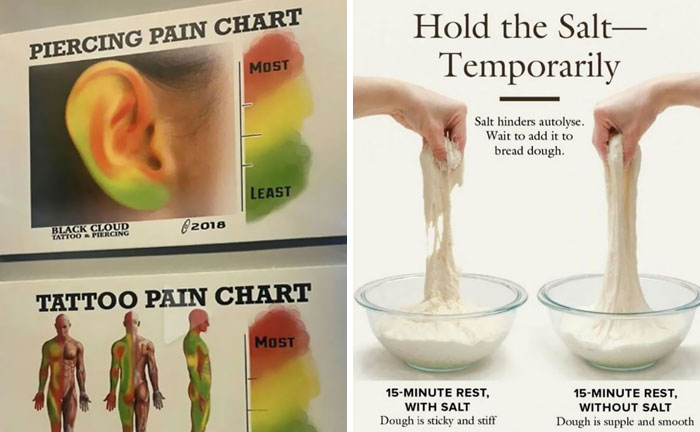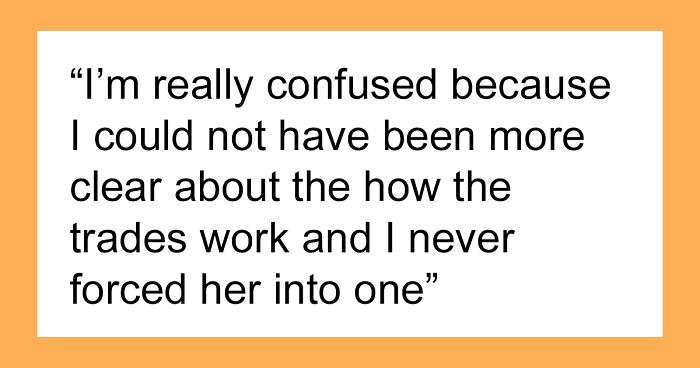
191Kviews
40 Times People Spotted Such Weird Ads, They Just Had To Share Them In The ‘Ads With Threatening Auras’ Facebook Group (New Pics)
Ads are downright creepy. They follow you around the internet after you looked at a specific product on Amazon and won't leave you alone even if you eventually make the purchase. But it's not just their behavior, ads can be freaky by design, too.
There's a Facebook group, called 'Ads with threatening auras,' which you may have already seen on Bored Panda here and here, and its content is a perfect example of that.
More info: Facebook
This post may include affiliate links.
This one is brilliant in my opinion. Birth control is not a one sided responsibility
No, it is not. If you don't want a child, it is your responsibility( male or female) to keep it from happening.
Load More Replies...I have three children. We had all 3 in spite of birth control - including condoms. And they were all a surprise!
I was going to say that happened to me but not sure if I'd downvoted to another suspension :/ Surprises don't always turn out to be a bad thing. Just an unexpected life change.
Load More Replies...Sadly, far too many people believe that. Birth control can fail - even condoms; surprises can happen. What happens after should be up to the woman and whoever, if anyone, SHE chooses to involve in the decision. It is no one else’s business, least of all someone who wasn’t involved in the conception.
True, so much depends on the correct size or application of a condom. Their pearl index is 18, i.e. 18 women out of 100 (measured during 1 year) get pregnant when using a condom.
Load More Replies...My cousins IUD failed and she got pregnant. So yes there are suprises and mistakes
Oh man I wonder how many people read that and thought it was actually an option
I was basically told I couldn't have children so my first baby was 100% a surprise
Such a sign in a shop selling condoms is irritating, but the misused quotation marks make it more so. It's an error, in a sign about mistakes of all places. Or is that their point here?
FINALLY someone else mentions the misused quotation marks.
Load More Replies...No it's not. I know tons of women using birth control that still got pregnant. So there ARE mistakes
Load More Replies...The inconsistent quotes are tweaking me harder than I expected was possible.
If you are having m-f sex, pregnancy is always a possibility. The facts of life seem to have becomer terms and conditions that people accept without reading.!
Condoms are only 99% successful. So there can be a surprise even if a condom was worn. It's rare, but it happens
Yeah if it was true that all you needed was a condom I wouldn't be here
The ad is obviously not true, as having a baby could still be a surprise without a condom (if the woman is using birth control, for example), but point well taken.
Maybe just chill a bit? This is a humorous add for condoms. Just that.
Load More Replies...Well being that not all contraceptives are 100% effective, this could be a surprise. Oh and men sometimes take it off (see "stealthing"). Some idiots without sexual education believe in some weird myths like you can't get pregnant in a hot tub, or while on their periods, etc. Some women remove or stop birth control too. So yeah, it could be a surprise to one or both parties involved.
Funny story . When I was like seven years old, I was on holiday in India visiting my grandparents and cousins and aunt and uncle. So when my cousin and I were watching tv, an ad for condoms came up, complete with some strange visuals. I had to run to the bathroom because I was going to throw up . Don’t forget, I was seven and my cousin was nine.
Condoms are only 98 percent effective. 2 out of 10 will eventually become pregnant.
Ads are trying to convince us that if we buy this or that, our lives will get better, however, we humans have a natural defense mechanism against consumerism.
The University of Warwick's Andrew Oswald and his team compared survey data on the life satisfaction of more than 900,000 citizens of 27 European countries from 1980 to 2011 with data on annual advertising spending in those nations over the same period. The researchers discovered an inverse connection between the two. The higher a country's ad spend was in one year, the less satisfied its citizens were a year or two later. Their conclusion was simple: advertising makes us unhappy.
"Colleagues and I have been studying human happiness for 30 years now, and recently my focus turned to national happiness," Oswald told Harvard Business Review about the origins of these findings. "What are the characteristics of a happy country? What are the forces that mold one? What explains the ups and downs? I'd never looked at advertising before, but I met a researcher who was collecting data on it for a different reason, and it seemed to me that we should combine forces."
"Like a lot of people in Western society, I can't help noticing the increasing amount of ads we’re bombarded with. For me, it was natural to wonder whether it might create dissatisfaction in our culture: How is your happiness and mine shaped by what we see, hear, and read? I think it's rather intuitive that lots of ads would make us less happy. In a sense, they're trying to generate dissatisfaction—stirring up your desires so that you spend more on goods and services to ease that feeling. I appreciate, of course, that the world’s corporate advertisers and marketing firms won’t like hearing me say that."
Oswald said the results are really significant. "When you look at changes in national happiness each year and changes in ad spending that year or a few years earlier—and you hold other factors like GDP and unemployment constant—there is a link," he explained. "This suggests that when advertisers pour money into a country, the result is diminished well-being for the people living there."
The official industry line is that advertising is trying to expose the public to new and exciting things to buy, and its task is to simply provide information. But the alternative argument, which goes back to Thorstein Veblen and others, is that exposing people to a lot of advertising raises their aspirations—and makes them feel that their own lives, achievements, belongings, and experiences are inadequate.
This study supports the negative view.
"The idea here is a very old one," Oswald said. "Before I can decide how happy I am, I have to look over my shoulder, consciously or subconsciously and see how other people are doing. Many of my feelings about my income, my car, and my house are molded by my next-door neighbor’s income, car, and house. That’s just part of being human: worrying about relative status. But we know from lots of research that making social comparisons can be harmful to us emotionally, and advertising prompts us to measure ourselves against others."
In other words, if I see an ad for a fancy new car, it makes me think about my ordinary one, which might make me feel bad. Or if I see this fancy $10,000 watch and then look at my own, which probably cost around $150, I might think, "Maybe there’s something wrong with me."
"In this paper, we don’t prove that the dissatisfaction is coming from relative comparisons, but we suspect that’s what happens," Oswald said.
That was something…. I just have not found out how to describe it yet..
Wsgbxgkftbbfhkiufd ...is my attempt. Or rather ahclchchcvjbkgurvuvignnnn?
Load More Replies...This was a good one, some of these were wow others obvious plants. Still enjoyed going through these.
welp i think it is time to introduce this place to r/itemshop,but i myself have not figured that out yet
That was something…. I just have not found out how to describe it yet..
Wsgbxgkftbbfhkiufd ...is my attempt. Or rather ahclchchcvjbkgurvuvignnnn?
Load More Replies...This was a good one, some of these were wow others obvious plants. Still enjoyed going through these.
welp i think it is time to introduce this place to r/itemshop,but i myself have not figured that out yet

 Dark Mode
Dark Mode 

 No fees, cancel anytime
No fees, cancel anytime 




